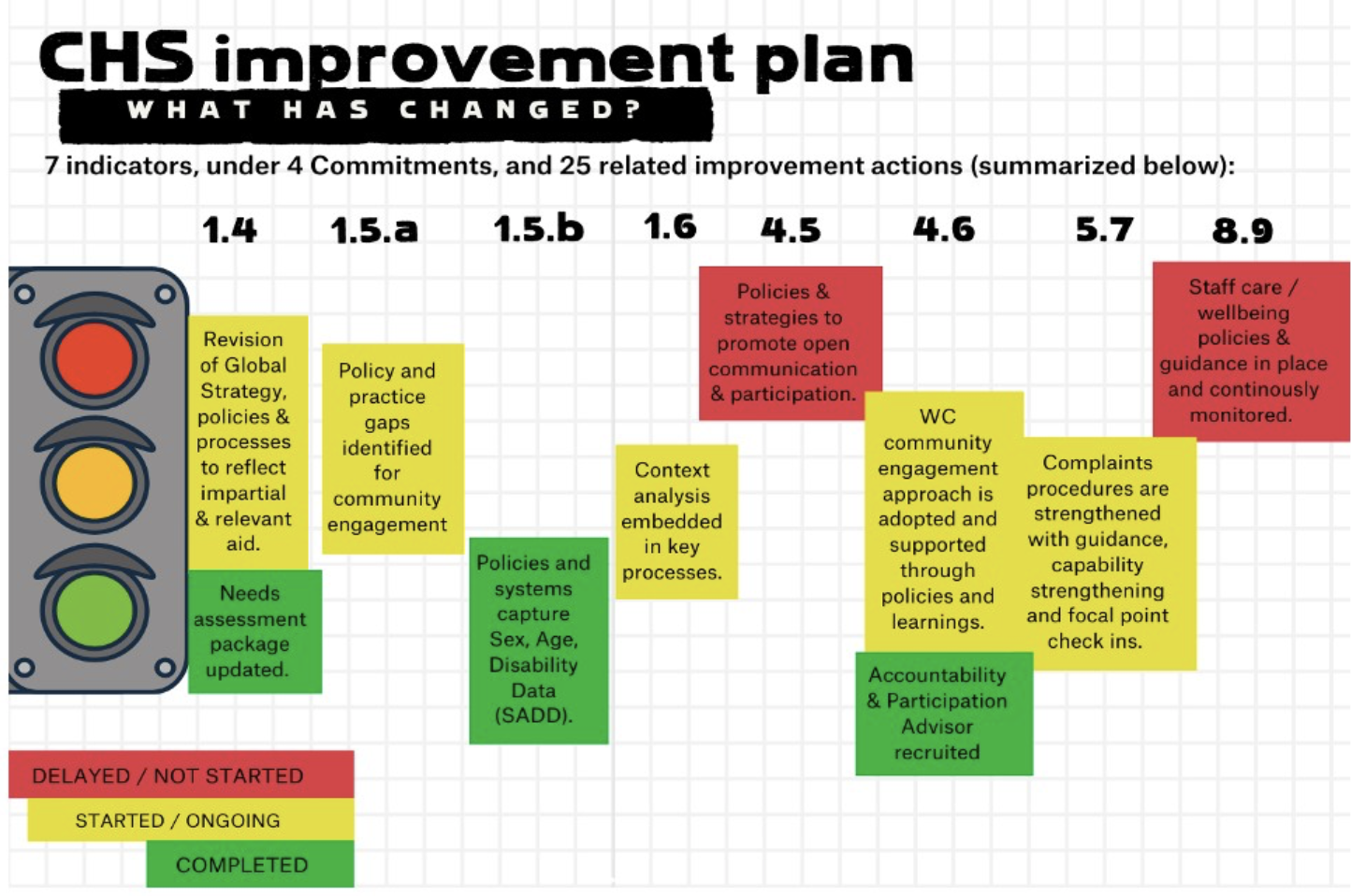Putting the plan into action – War Child Holland’s CHS change champions
At the end of 2021, War Child Holland looked back on our year-long accountability journey striving to better meet the Commitments of the Core Humanitarian Standard (CHS). Reflecting on the improvements we’ve made gives us renewed motivation to keep up the pace of change – for every child caught up in conflict that deserves to be supported with dignity, respect and agency. As the new year starts, we want to share what we’ve learned with fellow organisations who are on their way to making vital changes to be more accountable to those they serve.
Championing change
In November 2020, War Child Holland completed our CHS self-assessment.* To capitalise on this detailed learning and build momentum for starting on the actions in our improvement plan, we created a new internal CHS Steering Committee. Our Steering Committee met regularly to drive forward progress with focal points, keeping all of us focused and committed.
A year later, in November 2021, our internal CHS Steering Committee decided to celebrate and mark a year of improvements that came from the CHS self-assessment by producing a one year on progress report. We wanted this to be accessible, engaging and transparent for any colleague to learn more about what is happening and how they can get involved.
A chance to reflect
We are proud of the results of our hard work and believe that the CHS improvements we’ve made, and will continue to make, contribute to tackling the toughest challenges we face as a sector.

Graphic from War Child Holland’s progress report.
Our progress report highlights these achievements:
- We updated our needs assessment package through a wide consultation process to increase its use and improve our practice. It offers guidance and tools for assessing needs, strengths and opportunities in a community before we begin a programme to make sure that what we deliver is relevant. After hearing the strong call for community consultation as a starting point at the 2021 CHS Exchange, the package now also emphasises this essential building block. These changes are linked to our improvement action from our 2020 CHS self-assessment, specifically indicator 1.4. ‘Policies commit to providing impartial assistance based on the needs and capacities of communities and people affected by crisis.
- We put in place practical guidance and tools to begin disaggregating by disability when counting the number of people we serve in our programmes. We also created space to collect this new data in our Management Information System, alongside tying it to our annual reporting templates. Making these improvements help us better meet CHS indicator 5. “Policies set out commitments which take into account the diversity of communities, including disadvantaged or marginalised people, and to collect disaggregated data.”
- Finally, we brought on a new Accountability & Participation Advisor. This position has been dedicated to an update of our feedback, complaints & response mechanism, which is already being rolled out to create or strengthen existing mechanisms in our country offices. The need for this new role came out strongly in the results of our our improvement plan actions linked to CHS Commitments 4 and 5 on welcoming and addressing participation, feedback and complaints.
The progress report also created a space for us to reflect on and give more visibility to areas where we need to do better such as on CHS Commitment 8 on staff care and well-being, where we make a call for more measurable action and management accountability.
Invested in success
So how did all these changes happen? Here are some of the most valuable ‘how’ lessons we learnt from a year of making key CHS improvements:
- A cross-departmental internal Steering Committee of CHS “Champions” helps push improvement actions forward, especially if members have invested in success, i.e. are responsible for specific improvements;
- Creating an improvement plan narrowed our focus to specific priorities (instead of tackling many at once) within a set timeframe and allows us to see concrete progress, which is also an incentive;
- Raising this exercise to senior management and communicating widely about it gave it substantial visibility, management endorsement at various levels and those essential resources we could all use more of – time and budget;
- Hooking our improvement tracking to existing reporting structures creates accountability, keeps CHS at the forefront of our minds and links to important planning and decision-making moments.

War Child Holland’s newroom reporting on one year of CHS improvements.
Attention, please!
It is often a challenge to get attention with so many competing goals in organisations like ours that are trying to do so much. To make sure our colleagues felt engaged with our progress against better meeting the Nine Commitments of the CHS, we knew we had to prioritise communicating well. So we went for it! We paired the one-year progress report with a mini-TV news bulletin series that “aired” during our weekly organisation-wide meetings. We announced the TV segments on our internal communications platform – with the report attached. Members of the Steering Committee played the hosts and anchors of the show and interviewed colleagues leading initiatives tied to our CHS improvement plan in 10-minute question and answer sessions. We used the immersive viewer feature on Zoom so that it looked like we were inside a TV studio, and this got us plenty of laughs.
All in all, the report and particularly the TV news bulletins were well-received, but we will have to continue to find creative ways to keep us all motivated and deliver on the improvement-mindset that we are instilling throughout the organisation. In closing, our progress report included this quote from our CEO:
“At War Child we always aim to improve our work for children affected by armed conflict. Working towards meeting the Core Humanitarian Standard at the highest levels is one important way of strengthening our commitment to those children and their communities.”
I hope that these reflections on a year of championing CHS improvements across War Child Holland can help inspire fellow organisations committed to making key improvements. It’s not easy and we certainly have a lot more to do and can always do it better but looking back on a year of small wins alongside the setbacks gave us a much-needed energy boost to meet the Commitments that we have made.
Learn more about the CHS self-assessment verification process.
Discover our new training designed specifically for CHS Quality & Accountability focal points to help their organisations deliver on the CHS.
*The Core Humanitarian Standard on Quality and Accountability (CHS) was designed so that its application can be measured. Measuring performance through the CHS Verification Scheme helps organisations learn the extent to which accountability standards have been incorporated into their work and highlights which areas to improve. CHS self-assessment is a learning exercise. It helps organisations understand their capacity and performance against the CHS and builds a tailored improvement plan to make the services they deliver work better for the people affected by crisis.

